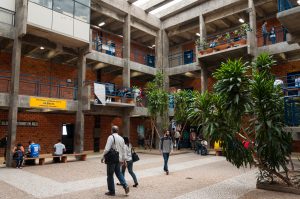Civil Engineering
 The Civil Engineering program enables students to provide technical, advisory and planning services in Civil Construction, Structures, Geodetic Sciences, Geotechnics and Transportation. The Civil Engineer works in a wide range of activities, from the development of projects to the construction of buildings, roads, dams, bridges, airports, urban infrastructure, slope stability, hydraulic engineering and sanitation.
The Civil Engineering program enables students to provide technical, advisory and planning services in Civil Construction, Structures, Geodetic Sciences, Geotechnics and Transportation. The Civil Engineer works in a wide range of activities, from the development of projects to the construction of buildings, roads, dams, bridges, airports, urban infrastructure, slope stability, hydraulic engineering and sanitation.
The program offers students practical laboratory classes and opportunities for the development of projects, besides scholarships offered through the Tutorial Education Program (PET) and the provision of technical services for the community through the Pilot Office of Civil Engineering.
The Department of Civil Engineering has eleven well-equipped laboratories for specific studies, besides access to Physics and Chemistry laboratories belonging to other departments. These include: the Geotechnical Mapping Laboratory, where soil samples are analyzed to identify their properties and verify the site’s feasibility for construction projects; the Structural Analysis Laboratory; and the Photogrammetry, Remote Sensing and Geoprocessing Laboratory.
In the first two years, students take foundation courses in Engineering, such as Calculus, Chemistry, Computer Science and Technical Drawing. After this period, they take specialized courses in Structural Calculation (for steel, concrete and wood), Geotechnics (including Soil Mechanics and Pavement), Transportation (Geometric Design and Implementation of Roads), and Geodetic Science (Topography and Photogrammetry).
Students also take elective courses throughout the program and in the last semester they do a professional training, usually in a company that has partnership with UFSC. In the last year, students must develop a final project in an area of their choice, under a professor’s supervision.
| Program Length: 10 semesters |
| Website: www.ecv.ufsc.br |
| Classes may be held in the morning, afternoon and evening. |




